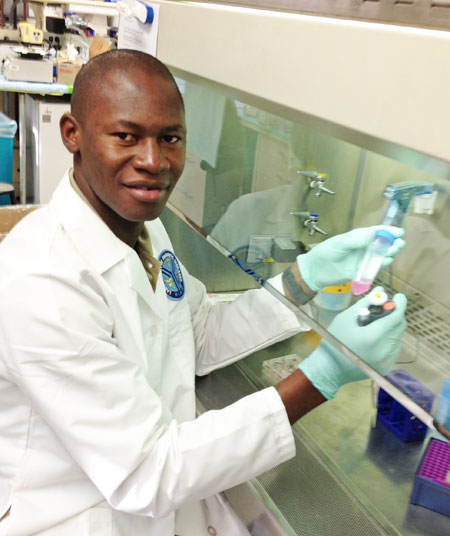School’s online learning makes knowledge accessible, translatable around the world
Physician uses epidemiology training to fight parasitic diseases in Mali
December 1, 2015
Earning a medical degree from the University of Bamako in Mali was only the beginning for Moussa Sangare.
Sangare’s desire for stronger skills in epidemiology led him to obtain online training through UNC Gillings School’s North Carolina Institute for Public Health. He completed the E is for Epidemiology online training series, which includes 11 online modules, and the Advanced Data Analysis: Methods to Control for Confounding online module.
Sangare is a faculty member of medicine and dentistry at the University of Sciences, Technique and Technology of Bamako. For three years, he has led a National Institute of Allergy and Infectious Diseases (NIAID)-funded project in Mali focused upon cutaneous leishmaniasis, a parasitic disease, spread by the bite of sand flies, which causes skin sores. Specifically, he studies how people’s leishmaniasis infections can be influenced by their immunity to the sand fly’s salivary proteins and/or their having been infected with another parasitic disease, filariasis.
The free online training helps Sangare better understand how to generate a research question, elaborate hypotheses, design a research study, use statistics to test a hypothesis, and choose the appropriate tests for various study designs.
“These courses helped me to develop strong scientific knowledge and approaches to better understand the distribution and determinants of disease in populations to improve public health,” said Sangare. “I really value that the online training is free and easily accessible. Because you can download the PowerPoint presentations with audio files, you can listen to them anytime, anywhere, and that makes a difference. You can put the information you learn to use immediately in the field.”
Sangare plans to take more online training courses in preparation for pursuing a Master of Public Health degree with a veterinary epidemiology concentration.
Funding support for the E is for Epidemiology training series was provided through the UNC Preparedness and Emergency Response Center, through a cooperative agreement with the Centers for Disease Control and Prevention.

